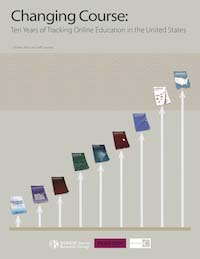Over 6.7 Million Students Learning Online
Wellesley, MA (US), February 2013 - The 2012 Survey of Online Learning conducted by the Babson Survey Research Group reveals the number of students taking at least one online course has now surpassed 6.7 million. However, higher education adoption of massive open online courses (MOOCs) remains low, with most institutions still on the sidelines.
"The rate of growth in online enrollments remains extremely robust, even as overall higher education enrollments have shown a decline," said study co-author Jeff Seaman, co-director of the Babson Survey Research Group. 
"Institutional opinions on MOOCs are mixed," added co-author I. Elaine Allen. "Some praise them for their ability to learn about online pedagogy and attract new students, but concerns remain about whether they are a sustainable method for offering courses."
Todd Hitchcock, senior vice president of online solutions, Pearson Learning Solutions, stated, "Learning is no longer limited to four walls-”learning can happen anywhere-”and it already is happening everywhere, every day. The growth of online learning underscores this need for quality, flexible education programs that meet the demands of our 21st-century workforce."
Frank Mayadas, senior advisor to the Alfred P. Sloan Foundation and founding president of the Sloan Consortium, noted, "As in past years, the survey demonstrates the continuing robust growth in a wide range of institutions. It underscores the importance of online learning in higher education in the US. What a remarkable ten-year period the survey has captured."
Key report findings include:
- Over 6.7 million students were taking at least one online course during the fall 2011 term, an increase of 570,000 students over the previous year.
- Among higher education students, 32 percent now take at least one course online.
- Only 2.6 percent of higher education institutions currently have a MOOC; another 9.4 percent report MOOCs are in the planning stages.
- Academic leaders remain unconvinced that MOOCs represent a sustainable method for offering online courses, but do believe they provide an important means for institutions to learn about online pedagogy.
- Among academic leaders, 77 percent rate the learning outcomes in online education as the same or superior to those in face-to-face classes.
- The proportion of chief academic officers who believe their faculty accept the value and legitimacy of online education has not increased -” it now stands at only 30.2 percent.
- The proportion of chief academic leaders who say online learning is critical to their long-term strategy is at a new high of 69.1 percent.
- The perception of a majority of chief academic officers at all types of institutions is that lower retention rates for online courses remain a barrier to the growth of online instruction.
The tenth annual survey, a collaborative effort between the Babson Survey Research Group and the College Board, is the leading barometer of online learning in the United States. It is based on responses from more than 2,800 academic leaders.








